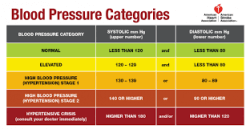Normal Blood Pressure
In this article, we will look at what normal blood pressure is, why we should aim to maintain healthy blood pressure, and what we can do to avoid high or low blood pressure. To properly understand these issues, we first need to know a few basic things about blood pressure.
What is Blood Pressure?
Blood pressure is the term used to describe the force with which your blood pushes against the sides of your blood vessels as the heart pumps blood around your body. Blood pressure indicates the amount of work your heart is doing to pump blood through your arteries.
How is Blood Pressure Measured?
Healthcare professionals usually use a stethoscope and a device called a sphygmomanometer to measure your blood pressure. Typically they take a blood pressure reading on your upper arm.
Blood pressure is measured in millimeters of mercury (mmHg) and is expressed as a measurement with two numbers, like a fraction, such as 120/80mmHg. This example can also be expressed as 120 over 80.
The first or top number is called systolic pressure, which is the pressure in your arteries when your heart pushes blood out.
The second or bottom number is called diastolic pressure, which is the pressure when your heart rests between beats.
So, for example, if your blood pressure is 140 over 90 or 140/90mmHg, it means you have a systolic pressure of 140mmHg and a diastolic pressure of 90mmHg.
What Is Normal Blood Pressure?
As a general guide, for an adult, the blood pressure readings are categorized as follows:
– Low blood pressure is considered to be lower than 90/60mmHg.
– Normal blood pressure is considered to be between 90/60mmHg and 120/80mmHg.
– High blood pressure is considered to be 140/90mmHg or higher.
If your systolic pressure is consistently between 120 and 129, and your diastolic pressure is less than 80, then you have what is called elevated blood pressure. People with elevated blood pressure are likely to develop actual high blood pressure unless steps are taken to control the condition.
High Blood Pressure
People with readings of 130/80 or higher, on at least two occasions, are said to have high blood pressure. High blood pressure is also called hypertension.
What are the Symptoms of High Blood Pressure?
High blood pressure often has no symptoms, therefore many people who have high blood pressure don’t realize they have it. For this reason, high blood pressure is often called “the silent killer.”
However, if your blood pressure is very high, you may notice signs such as:
• Severe headache
• Tiredness or confusion
• Nosebleeds
• Vision problems
• Chest pain
• Trouble breathing
• Irregular heartbeat
• Blood in the urine
• Pounding in your chest, neck, or ears
If you have any of these symptoms, see a doctor immediately. You could be having a hypertensive crisis that could lead to a heart attack or stroke, and requires urgent medical attention.
What Causes High Blood Pressure?
The exact causes of high blood pressure are not known, but it is is often related to unhealthy lifestyle habits and but several factors and conditions that may play a role in its development, including:
• Smoking
• Being overweight or obese
• Lack of physical activity
• Excessive salt in the diet
• Excessive alcohol consumption
• Stress
• Older age
• Genetics
• Family history of high blood pressure
• Chronic kidney disease
• Adrenal and thyroid disorders
• Sleep apnea
Because high blood pressure often has no symptoms, it is a good idea to regularly check your blood pressure at a health facility, especially if one or more of the above conditions is present in your life.
Risks of high blood pressure
If your blood pressure is too high, it puts extra strain on your blood vessels, heart and other organs, such as the brain, kidneys, and eyes.
Left untreated, high blood pressure can increase your risk of developing a number of serious, long-term health conditions, such as:
• heart disease
• heart attacks
• strokes
• heart failure
• peripheral arterial disease – a common condition where a build-up of fatty deposits in the arteries restricts blood supply to leg muscles.
• aortic aneurysms – An abdominal aortic aneurysm – bulge or swelling in the aorta, the main blood vessel that runs from the heart down through the chest and tummy. The bulge can get bigger over time and could burst, causing life-threatening bleeding.
• kidney disease
• vascular dementia – Vascular dementia is a problem with mental abilities caused by reduced blood flow to the brain.
How to lower blood pressure
Your diet, physical activity levels, and weight have a real effect on your blood pressure. If you have high blood pressure, you can start lowering blood pressure today by eating more healthily and being more physically active.
Reducing your salt intake, eating more fruit and vegetables, and keeping to alcohol limits will lower your blood pressure.
Eat less salt to lower blood pressure.
Eating too much salt is the biggest cause of high blood pressure – the more salt you eat, the higher your blood pressure will be. Salt makes your body retain water. If you eat too much, the extra water stored in your body raises your blood pressure.
This can be a particular problem if you already have high blood pressure. Also, eating too much salt may mean that blood pressure medicines, such as diuretics, don’t work as well as they would without the extra salt.
Therefore cutting the amount of salt you consume is one of the quickest ways to lower your blood pressure (especially if you have high blood pressure).
- Eat more fruit and vegetables to lower blood pressure. Eating more fruit and vegetables has been proven to help lower blood pressure. Fruit and vegetables are full of vitamins, minerals, and fiber to keep your body in good condition.
- They also contain potassium, which helps to balance out the negative effects of salt. This has a direct effect on your blood pressure, helping to lower it. To help lower blood pressure, adults should aim to eat at least five different portions of fruit and vegetables each day. A portion is about 80 grams or roughly the size of your fist.
- Drink less alcohol to avoid high blood pressure. If you drink too much alcohol, this will raise your blood pressure over time. In addition, alcohol contains a lot of calories which can make you gain weight and as a result increase your blood pressure.
- Engage in exercise and physical activity to lower blood pressure.
Being more active and taking regular exercise lowers blood pressure by keeping your heart and arteries in good condition. - However, if your blood pressure is very high, you should not start any new activity without first consulting your doctor. Different kinds of exercise and activity have different effects on your body.
If you have high blood pressure, you should try to focus on activities that will help your heart and blood vessels. Aerobic or cardiovascular activity is the type that helps your heart the most.
Aerobic activities are generally repetitive and rhythmic movements, and they use the large muscle groups of your body, such as those in your legs, shoulders, and arms.
Walking, swimming, jogging, dancing, and digging are all aerobic activities. Other forms of activity are not as helpful, especially if you have not been exercising for a while.
For example, you should not do any exercise that is very intense for short periods of time, such as sprinting or weightlifting. These kinds of activities will quickly raise your blood pressure and will put unwanted strain on your heart and blood vessels.
Limit your intake of saturated fat.
Your body needs a certain amount of cholesterol to work properly, but not too much. If there is too much cholesterol in your blood it can build up on the sides of your arteries, narrowing them and increasing your risk of a heart attack or stroke. The type of fat that you eat is important because some types of fats are more likely to raise your cholesterol levels while other types of fat will help to lower it.
Your body uses saturated fat to make cholesterol therefore eating too much-saturated fat will raise your cholesterol. Too much cholesterol can raise your risk of heart disease and stroke, so if you have high blood pressure it is very important to keep your cholesterol levels low.
Saturated fat is usually found in animal products such as red meats, pork, butter, ghee, and cheese. It is also found in many baked goods such as cakes, pastries, and biscuits and also in the plant-based oil palm oil and coconut oil.
Replace these saturated fats with products high in monounsaturated fat such as rapeseed and olive oil, or high in polyunsaturated fats such as sunflower and corn oil.
Take medication if advised by your doctor. Some people with high blood pressure may also need to take one or more medicines to stop their blood pressure from getting too high.
Low blood pressure
Low blood pressure is known as hypotension. In adults, a blood pressure reading of 90/60 mmHg or below is often considered hypotension.
Low blood pressure is less common than high blood pressure. Some medicines can cause low blood pressure as a side effect. It can also be caused by a number of underlying conditions, including heart failure and dehydration.
Is low blood pressure dangerous?
Usually, having low blood pressure is not a cause for concern. However, sometimes your blood pressure can drop to a point where you may feel faint or dizzy. Also, blood pressure that is too low doesn’t supply your body and heart with enough oxygenated blood.
Most people with low blood pressure will not need treatment. Most doctors will only consider chronically low blood pressure as dangerous if there is a serious known cause for it in a particular case, or if it causes noticeable symptoms, such as:
• lightheadedness or dizziness
• feeling sick
• blurred vision
• generally feeling weak
• confusion
• fainting
Get your blood pressure checked if you keep getting such symptoms.
How is low blood pressure treated?
If your doctor or nurse feels that you would benefit from treatment, they will often try to find a cause for your low blood pressure. If they can find the cause, they should be able to decide on the most appropriate treatment for you.
Some potential causes of hypotension can include:
• blood loss
• heart problems
• dehydration
• pregnancy
• severe infection
• anaphylaxis
• malnutrition
• endocrine problems
• certain medications
If the cause of the low blood pressure cause can be found, your doctor will be able to recommend treatment to ease your symptoms.
Medicine to increase blood pressure is rarely needed because simple lifestyle changes or treating the underlying cause of the low pressure is usually effective.
Conclusion
Keeping your blood pressure in the normal range is important in reducing the risk of significant complications such as heart disease and stroke. A combination of healthy lifestyle habits, weight loss, and possibly medications can help maintain normal blood pressure or lower your blood pressure.
Remember that high blood pressure usually does not have any symptoms. That is why it’s recommended to have your blood pressure checked by a healthcare professional at least once a year. You may require more frequent checks if your readings are high.
=====
Sources
https://www.nhs.uk/common-health-questions/lifestyle/what-is-blood-pressure/
https://www.nhs.uk/conditions/low-blood-pressure-hypotension/
http://www.bloodpressureuk.org/BloodPressureandyou/Yourlifestyle
https://www.healthline.com/health/high-blood-pressure-hypertension/blood-pressure-reading-explained
https://www.webmd.com/hypertension-high-blood-pressure/
https://www.webmd.com/hypertension-high-blood-pressure/hypertension-assessment/default.htm
https://www.heart.org/en/health-topics/high-blood-pressure/understanding-blood-pressure-readings





